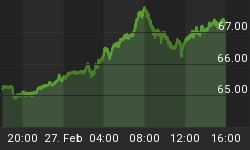Despite loud huzzahs from a variety of boosters who proclaimed that Chairman Bernanke spoke with gravitas and wisdom at the first ever Federal Reserve press conference, the wider investing public clearly saw the performance as unconvincing. During and immediately after the proceedings the prices of gold and silver rose strongly to new highs as the U.S. dollar plummeted. The affair seemed to solidify the understanding that Bernanke and his cohorts have no intention whatsoever to reverse the current trend of inflation and a weakening dollar.
With all the preliminaries swept away, it appears that the great dollar slide that we have long feared will not be interrupted. In the last year alone, the dollar has fallen 25 per cent against the Swiss Franc, (the gold standard of fiat currencies) - with one quarter of that decline coming since the beginning of April alone. Against gold itself (the gold standard of all forms of money), the decline has been even worse, 31 per cent so far this year, and 8 per cent this month.
Ominously, the dollar index (the broadest measure of dollar strength) is just a percentage point or two above the all time lows that it set before the financial panic of 2008 sent spooked investors into the apparent safety of America's deep and liquid Treasury market. It appears that spell has now been fully broken.
Bernanke's press conference was heralded as a chance for the press to ask penetrating and unscripted questions to the Chairman. However, only a handful of reporters were selected and they were limited to single questions. As any lawyer will tell you, usually it is not a single question, but a line of questioning that tends to tease out the truth.
In addition, it is no accident that Bernanke called upon reporters who were likely to tread lightly upon him, including the reliably supportive Steve Liesman of CNBC. One intrepid Financial Times reporter even asked the Chairman how the investing public can be persuaded to give up their irrational fear of inflation! Given the supportive environment it was easy for Bernanke to appear commanding and reassuring while skirting the key issue of latent inflation.
Clearly however, Chairman Bernanke still was worried about the slow pace of the U.S. recovery. Claiming substantial success for his QE1 and 2, he left the door at least partially open for a QE3. Perhaps this, more than anything, tipped his hand to the anti-inflation hawks. Most probably, they continue to believe that the Fed will assist the Administration in its bid to inflate out of recession by means of political life support rather than genuine consumer demand. Many investors now accept that the government's plan involved debasing the U.S. dollar to erode the massive and profligate debts of the U.S. Treasury.
Key to the reasoning of Bernanke and his FOMC are balancing the rates of inflation and unemployment in pursuit of the Fed's dual mandate of securing sound money and employment. Somewhere along the way, although never proclaimed officially, the Fed decided that its "mandate" compels them to maintain inflation at a minimum of 2 per cent annually. With Bernanke citing the official inflation rate at 1.3 percent, the conclusion is easily made that the Fed sees no reasons to step on the brakes.
At the same time he expressed sympathy for those American householders who are experiencing inflation at least in double digits for oil and food. This means that, in terms of real money, all investors in bank deposits are being robbed of some 8 per cent each year. This hidden transfer of wealth from the private to the public sector and their banks is just part of the massive general and stealthy transfer of wealth from the private sector.
In 1994, in response to political pressure the formula used to calculate unemployment figures was changed. It is my belief that the current methodology understates the true number of unemployed. Most notably this was achieved by excluding those unemployed over the long-term. Although knowing this better than anyone, Bernanke expressed concern about the level of long-term unemployment. However, in claiming to show the efficacy of his recent policies he continued to quote the 8.8 per cent unemployment figures that exclude such workers. If he had included them the real level would be some 16.2 percent.
While the stock markets welcomed the fact that Bernanke intends to continue his covert inflationary policies, the currency, gold and silver markets were not fooled and gave Bernanke a resounding thumbs down.
Subscribe to Euro Pacific's Weekly Digest: Receive all commentaries by Peter Schiff, Michael Pento, and John Browne delivered to your inbox every Monday.
Click here for free access to Euro Pacific's new special report: What's Ahead for Canadian Energy Trusts?
Be sure to pick up a copy of Peter Schiff's hit economic fable, How an Economy Grows and Why It Crashes.















